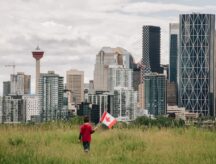Canada refines definition of “essential travel” during coronavirus
With travel restrictions still in place, Canada has clarified what types of trips are considered “essential” in order to gauge which travellers should be let into the country.
Foreigners who are exempt from Canada’s coronavirus travel restrictions, such as temporary foreign workers, immediate family members of Canadians, and certain international students, must demonstrate the purpose of their trip is for an essential reason. In the government’s words, the reason must be “non-optional” or “non-discretionary.”
Meanwhile, the mandatory quarantine period for new arrivals and the restriction on travel for sick individuals are still at play. With few exceptions, everyone who enters Canada from abroad must undergo 14 days of self-isolation. Furthermore, they must demonstrate that they have an adequate quarantine plan.
Find out if you are eligible for any Canadian immigration programs
At the end of the day, it is up to the officer to assess whether or not the reason for the trip is permissible for entry to Canada.
Some of the travel purposes that are considered essential may be:
- economic services and supply chains;
- providing service that is essential to the health, safety, security, or economic well-being of Canadians and the government, in other words, “critical infrastructure support;”
- health (immediate medical care), safety and security;
- supporting Indigenous communities;
- transiting through Canada for essential purposes;
- studying in Canada if approved before March 18, 2020, Canada is still accepting applications for international students and will advise them when travel opens to them;
- tending to sick family members who have no one else to help them in Canada; or
- any other activities that are deemed “non-optional” or “non-discretionary” by the Canadian government.
The government defines “optional” or “discretionary” travel as coming to Canada for the purposes of tourism, recreation, and entertainment among others. Some examples of trips that the government does not consider essential include:
- visiting family for a vacation;
- coming to Canada for the birth of a new family member, although they may make an exception for the baby’s parent;
- visiting a secondary home even for the purposes of upkeep and maintenance; or
- attending the funeral of a family member, as quarantine measures in Canada already limit the number of attendees allowed at funerals under provincial restrictions.
What about family reunification?
Family ties will not automatically qualify as essential travel. Travelling family members of Canadian citizens and permanent residents must prove that they are travelling for an essential reason such as:
- taking up full-time residence in Canada, which includes prospective permanent residents as well as temporary residents who are coming to Canada to live with immediate family members;
- caring for sick family members or family members who are otherwise unable to care for themselves when no other arrangements can be made, the 14-day quarantine for travellers will still factor into whether the travel is considered discretionary; or
- shared custody agreement across borders, as this would be in compliance with a court order.
This is not an exhaustive list. Foreigners are also allowed to spend the pandemic period with their immediate Canadian family members to help ensure each other’s health, safety, and well-being. This allows families to be together during this difficult time, the government webpage says.
Learn more about Canadian family sponsorship
Travellers must demonstrate they have an adequate quarantine plan
All foreigners travelling to Canada must self-quarantine for a period of 14 days upon arrival. They will be asked to provide their quarantine plan, with answers to questions such as:
- Where will they stay?
- How will they get groceries and medicine without going to the store?
- Will there be vulnerable people where they are staying?
If they cannot prove that they have an adequate quarantine plan, travellers may be forced to stay in a hotel or another facility that the government has deemed suitable for quarantine.
Certain work permit holders could be exempt from completing the self-isolation period if they work in occupations that are critical for health, safety, and food security reasons. These work-permit exempt foreign nationals include:
- providers of emergency services for the protection or preservation of life or property, which includes firefighters and medical service providers;
- people who are allowed to work for the primary purpose of training as a student in a health field, including as a medical elective, or a clinical clerk at a medical teaching institution in Canada. They will need written approval from the body that regulates the field;
- workers in the marine transportation sector who are essential for the movement of goods;
- workers who are entering Canada to deliver, maintain, or repair medical equipment and devices; or
- people entering Canada to make medical deliveries required for patient care in Canada such as cells, blood, and organs.
Canada has asked officers to prioritize these work permit exemption applications.
Get help with Canadian work permits
© 2020 CIC News All Rights Reserved
- Do you need Canadian immigration assistance? Contact the Contact Cohen Immigration Law firm by completing our form
- Send us your feedback or your non-legal assistance questions by emailing us at media@canadavisa.com






